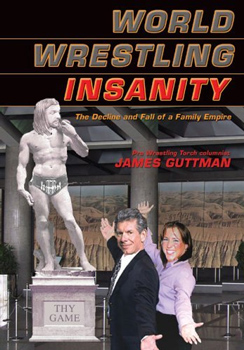It’s hard to talk about professional wrestling nowadays without mentioning the name McMahon.

The first family of sports entertainment, a term the McMahon family prefers over ‘wrestling’, has achieved complete dominance over the industry — a title threatened by no other. No doubt, baring this in mind, the smiles come often and wide if you’re a McMahon of World Wrestling Entertainment (WWE).
But for many wrestling fans, it is not a time to rejoice at all. For many, WWE no longer resembles their memories of professional wrestling from years gone by. Some continue to watch, others have walked away.
“What I wanted to do with this book was, I really wanted to present a view of the company for somebody who maybe hasn’t watched it in a while, or maybe has never watched it before,” said author James Guttman in an interview with SLAM! Wrestling. “It isn’t necessarily positive or negative. I tried to give different points of view on it. It is what it is.”
What Guttman has produced is a new book, entitled World Wrestling Insanity (ECW Press) and make no mistake, this is not a glorified dirt sheet that spews hearsay from anonymous insiders.
In a unique and daring style, the book explores how WWE has evolved into the current cult of sports entertainment that it is. More so, by analyzing a wide assortment of notorious on-air exploits by head owner Vince McMahon, his family, and other movers and shakers within the company, does Guttman give a glimpse into the insane logic behind this mega entertainment company.”I wanted to have a complete view of WWE and let the reader make up their own mind in seeing how crazy things are run (in WWE),” said Guttman.
Crazy? Could Guttman actually be talking about the same company that, not very long ago, was drawing record television ratings and arena sellouts everywhere?
“It’s that old fable about conquering the world, then sitting around on a rock and crying because there’s nothing else left to do,” Guttman told, in attempting to describe the current state of WWE. It is an accurate analogy.
Long-time followers of the wrestling game can remember vividly a time when Vince McMahon and his wrestling empire were on the verge of collapse. This, compliments of Atlanta based World Championship Wrestling (WCW), and the endless streams of cash funneled into the rival promotion from its owner, Ted Turner.
The near death experience awoke something in McMahon, though. For awhile, forced to fight for his very existence, he delivered some of the most memorable and entertaining professional wrestling product ever.
“Vince McMahon loves competition,” Guttman said. “He loves the thrill of competing and crushing someone else. Unfortunately, he succeeded and I think it took away a lot of his mojo. Now, because of that, he really doesn’t have much to do. Now, without competition, without that drive to push forward, I think the McMahons see anything that they do now as, not a waste, but not really needed. They’ve become complacent.”
So what is a multi-millionaire wres- sorry, sports entertainment tycoon to do?
Perhaps, in a sign that the creative well has run dry, one time rival Extreme Championship Wrestling (ECW) was dusted off and brought back into the spotlight. It is a perfect example of the company trying to place their own stamp of approval on it, and make a buck.”ECW is really different from the other nostalgic acts,” observed Guttman. “I think a good part of that is him (Vince McMahon) wanting to prove that he can do ECW his own way. Whether it’s successful or not is immaterial because at this point, WWE has figured out the right way to spin anything they do to make it seem like it is successful. If ECW were to be a major flop, there would be enough to be able to point to it and say ‘Well, we sold advertising time, we did this, we did that.’ I think this is an ego thing, just based on the way it’s playing out and how involved Vince McMahon has been with the product.”
From what Guttman analyzes in his book, it may very well be that inflated McMahon ego that is the new driving force behind the creative decision making process. It is best personified by the creative infrastructure now in place at Titan Towers. It is also the bane of what Guttman sees as the real problem with WWE.
“The performers they (WWE) have are the best things they have,” observed Guttman. “I think there’s a lot of people, with a lot of heart. I’ve never thought the problem is with the performers. I think creative is what’s bothering me.”
By ‘creative’, Guttman is referring to the cabal of writers who are responsible for churning out storylines that are, in turn, brought to life by the members of the roster. As noted by more than one insider, those writers are not exactly rabid wrestling fans, but obedient scribes who abide by the whims of the Vince McMahon, who ultimately approves all creations that are presented to their audience.
The end result, as shown in World Wrestling Insanity, is a tapestry of inconsistent, mind-numbing, stereotyping, tasteless story arcs that can leave the most die-hard fan wondering why he or she still watches WWE.
“They’re going for this comedic outlook on things and they’re not really coming up with fresh ideas and it really doesn’t seem like the agenda is to make anything new. I understand the need to create television and I understand the need not to just be a wrestling company. But if you’re going to script a weekly comedy or drama and it’s about a wrestling company, then you have to follow the rules that you would follow if you were any other TV show. They really don’t do that — there’s loop holes in the storytelling.”
Fact is though, people are still watching. Certainly, as television ratings go, an exodus has occurred. But somewhere out there, people are still watching, still buying pay per views, still attending live events.
“It’s people who love wrestling,” Guttman stated bluntly. “There are some people who just gravitate to anything that is wrestling. A lot of people have been conditioned; that wrestling is an escape. I think everybody could be happier, I think that even the people who are enjoying the product right now realize there are probably ways to fix it and they would enjoy it more. With Vince being the top company in town, that’s why he’s continuing to not feel the effects of his creative downfall.”
Believe it or not, Guttman’s book is not all about bodyslamming the McMahon family. In spite of all that may be wrong with today’s WWE, what is being done right is appropriately endorsed by Guttman.
“Coming out with a book like this, a lot of people assume, right off the bat, that this will be anti-McMahon, anti-Triple H book. When you read it, you’ll see that I praise them where they deserve it and I cut them down when they deserve it. That’s the hump you have to get over — that if you’re being negative, it’s usually because the product is not good. If I was writing about wrestling in late ’90s, I would have been hugely positive.”
As for WWE actually pursuing sane creative ventures in the future and bring the company back to their former glory… well, no one is crazy enough to speculate on that.

